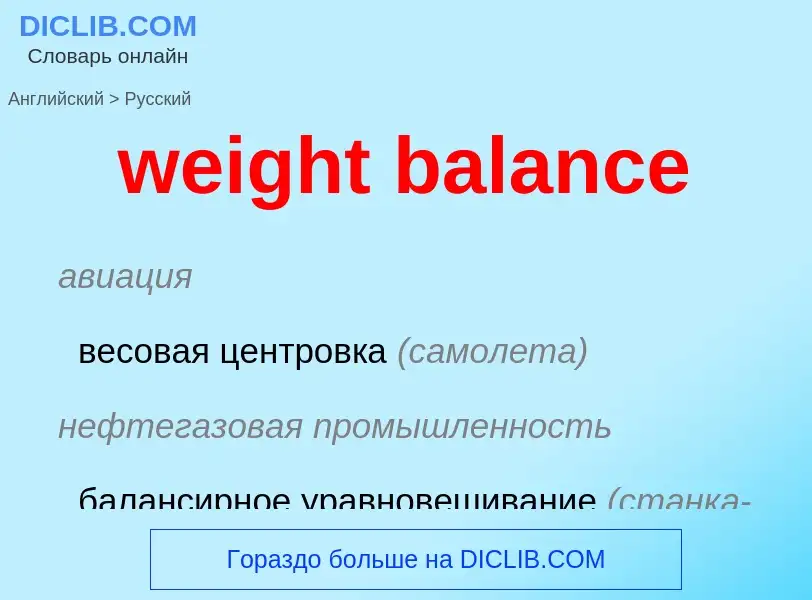Перевод и анализ слов искусственным интеллектом ChatGPT
На этой странице Вы можете получить подробный анализ слова или словосочетания, произведенный с помощью лучшей на сегодняшний день технологии искусственного интеллекта:
- как употребляется слово
- частота употребления
- используется оно чаще в устной или письменной речи
- варианты перевода слова
- примеры употребления (несколько фраз с переводом)
- этимология
weight balance - перевод на русский
авиация
весовая центровка (самолета)
нефтегазовая промышленность
балансирное уравновешивание (станка-качалки)
Определение
Википедия

False balance, also bothsidesism, is a media bias in which journalists present an issue as being more balanced between opposing viewpoints than the evidence supports. Journalists may present evidence and arguments out of proportion to the actual evidence for each side, or may omit information that would establish one side's claims as baseless. False balance has been cited as a cause of misinformation.
False balance is a bias which usually stems from an attempt to avoid bias and gives unsupported or dubious positions an illusion of respectability. It creates a public perception that some issues are scientifically contentious, though in reality they may not be, therefore creating doubt about the scientific state of research, and can be exploited by interest groups such as corporations like the fossil fuel industry or the tobacco industry, or ideologically motivated activists such as vaccination opponents or creationists.
Examples of false balance in reporting on science issues include the topics of human-caused climate change versus natural climate variability, the health effects of tobacco, the alleged relation between thiomersal and autism, alleged negative side effects of the HPV vaccine, and evolution versus intelligent design.


![Market hawker weighing meat (in [[catty]]) on a beam balance, Malaysia (1969) Market hawker weighing meat (in [[catty]]) on a beam balance, Malaysia (1969)](https://commons.wikimedia.org/wiki/Special:FilePath/143-29dev hawker weighingEs.jpg?width=200)


![A [[Roberval balance]]. The pivots of the parallelogram understructure makes it insensitive to load positioning away from center, so improves its accuracy, and ease of use. A [[Roberval balance]]. The pivots of the parallelogram understructure makes it insensitive to load positioning away from center, so improves its accuracy, and ease of use.](https://commons.wikimedia.org/wiki/Special:FilePath/Balance scale IMGP9755.jpg?width=200)
![Aluminum, mass-produced balance scale ([[steelyard balance]]) sold and used throughout China: the scale can be inverted and held by the larger ring beneath the user's right hand to produce greater leverage for heavier loads ([[Hainan]], [[China]], 2011) Aluminum, mass-produced balance scale ([[steelyard balance]]) sold and used throughout China: the scale can be inverted and held by the larger ring beneath the user's right hand to produce greater leverage for heavier loads ([[Hainan]], [[China]], 2011)](https://commons.wikimedia.org/wiki/Special:FilePath/Balance scales in China 02.jpg?width=200)

![feather of truth]]. feather of truth]].](https://commons.wikimedia.org/wiki/Special:FilePath/El pesado del corazón en el Papiro de Hunefer.jpg?width=200)




![FDACS's Bureau of Weights and Measures]]. FDACS's Bureau of Weights and Measures]].](https://commons.wikimedia.org/wiki/Special:FilePath/Inspected scale 2.jpg?width=200)
![Woman on a public weighing scale. [[Vienna]], [[Austria]], 2016 Woman on a public weighing scale. [[Vienna]], [[Austria]], 2016](https://commons.wikimedia.org/wiki/Special:FilePath/Kubanino sur stratpesilo (Vieno).jpg?width=200)
![decagram]] masses decagram]] masses](https://commons.wikimedia.org/wiki/Special:FilePath/Odważniki 2, ubt.jpeg?width=200)



![Weighing dishes from the island of [[Thera]], [[Minoan civilization]], 2000–1500 BC Weighing dishes from the island of [[Thera]], [[Minoan civilization]], 2000–1500 BC](https://commons.wikimedia.org/wiki/Special:FilePath/Archaeological site of Akrotiri - Museum of prehistoric Thera - Santorini - weighing dishes - 01.jpg?width=200)
![Roman [[steelyard balance]] with two bronze weights, 50–200 A.D., [[Gallo-Roman Museum, Tongeren]], Belgium Roman [[steelyard balance]] with two bronze weights, 50–200 A.D., [[Gallo-Roman Museum, Tongeren]], Belgium](https://commons.wikimedia.org/wiki/Special:FilePath/Weegschaal (unster) met 2 gewichten in brons, 50 tot 200 NC, vindplaats- Onbekend, collectie Gallo-Romeins Museum Tongeren, GRM 48.jpg?width=200)
![Manohar]] (AD 1615, Mughal dynasty, India). Manohar]] (AD 1615, Mughal dynasty, India).](https://commons.wikimedia.org/wiki/Special:FilePath/Meister der Jahângîr-Memoiren 001.jpg?width=200)
